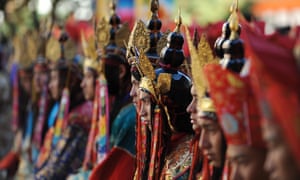Bhutan journalist hit by defamation suit for sharing Facebook post

Namgay Zam, who faces a fine of about 10 times the average annual salary or three years in prison, says case risks further subduing deferential media

It is known as the land of gross national happiness, a country that puts contentment before the trappings of wealth and power. But discontent is growing in Bhutan after one of the countrys best-known journalists was hit with a defamation suit for sharing a story on Facebook.
In a case that will test the boundaries of freedom of speech in the tiny Himalayan kingdom, independent journalist Namgay Zam, a former presenter on the state-run broadcaster Bhutan Broadcasting Service, faces imprisonment or a fine equivalent to 10 years salary if she is found guilty of defaming a prominent businessman.
Bhutan held its first democratic elections in 2008, and the transition from absolute monarchy to democracy has been a peaceful one. But Zam and her supporters argue that freedom of the press, a cornerstone of that democracy, is now under threat.
It appears the media can be held accountable in Bhutan, but not the countrys judiciary, Zam said in a telephone interview with the Guardian. And without freedom of the press, how can we prevent institutions becoming corrupted?
Zam is on trial in what is believed to be the first case of its kind in the country for sharing a Facebook post written by a woman about a property dispute between her family and a local businessman, Sonam Phuntsho. The post included allegations of forgery, as well as nepotism within the judiciary.
Zam says she shared the post of a brilliant 26-year-old medical doctor fighting hard to get justice for her family for her perspective as a human-interest story.
Along with the posts author, Dr Shacha Wangmo, Zam was charged on 12 August with libel and petty misdemeanour. Phuntsho is seeking 2.59m Bhutanese ngultrum (about 30,000) 10 times the average annual salary of a management executive in Bhutan. If she is found guilty and cannot pay the fine, Zam faces up to three years in prison.

A Bhutanese court will hear evidence from both defendants and the plaintiff on Friday.
Zam has started a petition on Change.org calling for an inquiry into the chief justice of Bhutan, who is also the son-in-law of the businessman seeking defamation costs against her.
Writing to Bhutanese parliamentarians she said: I do not write this letter in the hope of personal gain, but in the interests of justice and a vibrant democracy that we may not squander our precious gift from the Golden Throne, and to remind our honourable MPs that as the peoples elect, you have the sacred power and duty to set things right and demand accountability from persons appointed to important posts.
The case raises serious concerns, said Steven M Ellis of the International Press Institute.
It is extremely worrying that this defamation case is proposing a disproportionate penalty, and could have a potentially chilling effect on journalists ability to seek out the information they need, he said.
The impact of the suit could be far-reaching. Bhutans prime minister, Tshering Tobgay, has described it is a landmark case.
[O]ur job collectively is to enjoy our rights by protecting the rights of others and to make social media a safe, credible and a place where vibrant discussion takes place, and not the divisive debate that sometimes takes place on social media and definitely not while using an anonymous account, local news organisation Kuensel reported the prime minister as saying.
The countrys information and communications minister, DN Dhungyel, has suggested restrictions on social media could be introduced.
As of now, Bhutanese are using social media in a sensible manner but often we come across news that takes an unhealthy trend, he said.
For that, we do have a social media policy coming into force where we have incorporated certain restrictions regarding what we can share on social media and what we cant share or what kind of news can come into the social media, among others.
The case risks further subduing an already deferential national media, said Zam.
Weve had periods of total media blackout on this case, people are scared of even sharing or commenting on stories on social media, she said.
Unlike in other countries, our democracy was gifted to us by our king. I believe in earnest that we are squandering this precious gift by being apathetic, complacent, and needlessly practising high levels of self-censorship.
A report from the Journalist Association of Bhutan pointed to a media in crisis back in 2014. The majority of the 119 journalists and former journalists questioned thought the media situation was extremely bad, citing a lack of government support, an unsustainable economic model and an absence of quality journalism.
While the number of newspapers increased from four to 12 after the 2008 general election, almost all are at the brink of bankruptcy and closure, it stated.
Freedom of the press is guaranteed in Bhutans constitution, but half the journalists questioned believed it did not exist in practice, while 66% felt it it was difficult to access public information.